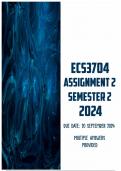, PLEASE USE THIS DOCUMENT AS A GUIDE TO ANSWER YOUR ASSIGNMENT
Please note that the author of this document will not responsibility for any plagiarizing you
commit.
1. Discuss the transfer payments (cash and in-kind transfer) in Malawi to alleviate inequality
and poverty. In the discussion include the effectiveness of the programmes. Write a maximum of
400 words for 20 marks. Use your textbook, search on Google Scholar and the Unisa library, and
use the Harvard method of referencing for any sources used, cited, and for the reference list.
Essay 1
Transfer payments, including both cash and in-kind transfers, are crucial social protection tools in
Malawi aimed at alleviating poverty and reducing inequality. These payments are part of the
government’s broader social protection policy framework designed to support vulnerable groups,
including the elderly, orphans, and low-income households. Cash transfers typically involve direct
financial support to poor households, while in-kind transfers provide goods such as food, education,
or health services.
The largest cash transfer programme in Malawi is the Social Cash Transfer Programme (SCTP), also
known as Mtukula Pakhomo. This programme targets ultra-poor households, specifically those that
are labour-constrained, by providing regular cash transfers. The SCTP has been shown to
significantly reduce poverty levels, improve food security, and enhance access to education and
healthcare. Studies have demonstrated that beneficiaries of the programme experience better
livelihoods and greater economic resilience, particularly during times of crisis such as droughts and
floods. The SCTP also contributes to narrowing income inequality by redistributing wealth to the
poorest segments of the population.
In-kind transfers in Malawi include the Farm Input Subsidy Programme (FISP), which provides
smallholder farmers with subsidised agricultural inputs such as seeds and fertiliser. This programme
is aimed at increasing agricultural productivity, food security, and rural incomes. FISP has had
mixed results; while it has improved food security for many households, issues such as corruption,
inefficiency in distribution, and targeting errors have undermined its overall effectiveness. Some
critics argue that FISP has not substantially reduced rural poverty or inequality in the long term due
to its narrow focus on agricultural inputs rather than addressing broader structural issues in the rural
economy.
While both cash and in-kind transfers in Malawi have shown potential in reducing poverty, their
effectiveness is constrained by limited funding, targeting challenges, and occasional mismanagement.
Furthermore, the programmes do not fully address systemic factors such as unemployment, access to
education, and health disparities, which continue to perpetuate poverty and inequality.
Conclusion
Malawi's transfer payment programmes, particularly the SCTP and FISP, have made notable strides
in alleviating poverty and reducing inequality. However, their effectiveness is limited by structural
inefficiencies and insufficient focus on long-term economic transformation. A more integrated
approach that addresses the root causes of poverty could significantly enhance these programmes'
impacts.




